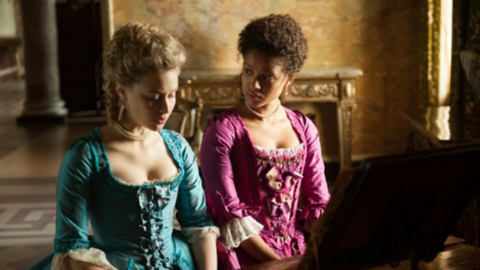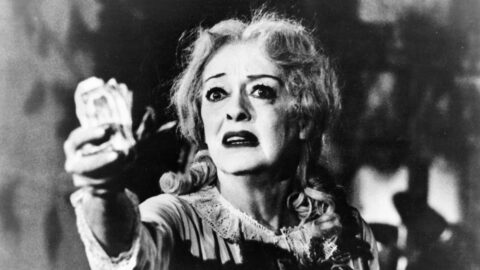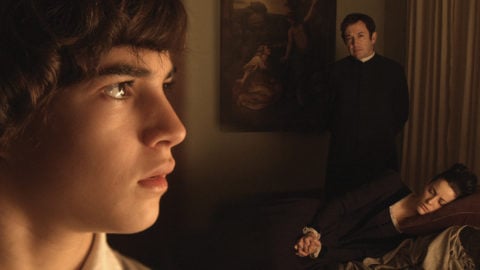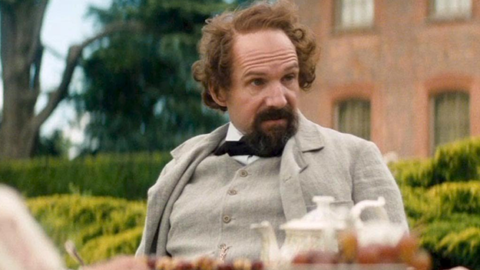A Room with a View (1985)
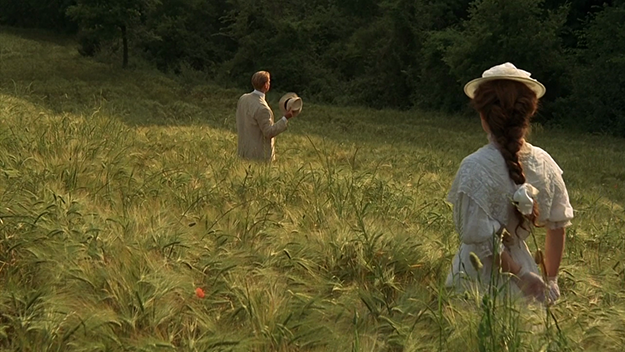
In 1985, a movie opened that tells the story of a frankly sexual attraction between two young people, with scenes that include the bloody death throes of a stabbing victim, as well as skinny-dipping with frontal, flapping male nudity that’s still not exactly common in mainstream cinema. Yet it’s this film—A Room with a View, the first of three E.M. Forster adaptations from producer Ismail Merchant and director James Ivory—that cemented Merchant-Ivory as shorthand for genteel people in pretty settings.
All these years later, surely it’s time to sweep aside the preconceptions and see the film for what it is: fresh, sophisticated, and above all, passionate. And that A Room With a View is also lovely to look at detracts neither from its comic wisdom nor its status as one of the best movies of the ’80s.
Forster’s heroine, Lucy Honeychurch (Helena Bonham Carter), is what in 1908 was called a young lady of quality. She’s been carefully schooled in how to use the elaborate, impeccable manners of her caste to hold much of life at bay: awkward situations, disagreeable people, important decisions, and above all, love. There is comfort in this English style of living that has laid out the rules so clearly—at least until it encounters a place where people either don’t know the proprieties, or don’t care.
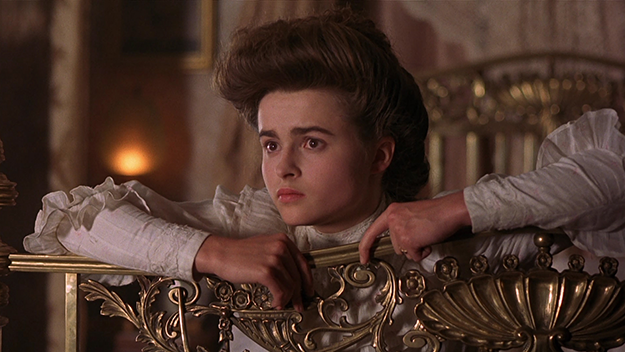
And so Lucy arrives at the Pensione Bertolini in Florence with her older cousin, the fluttering, fussy Charlotte Bartlett (Maggie Smith), and they must confront not only the Italian scorn for concealing emotions, but also fellow guests in their pensione: two Englishmen who persist in the unthinkable habit of speaking their minds. The father, bluff Mr. Emerson (Denholm Elliott), has a proletarian accent and a kindness he insists on bestowing, even when it’s being rejected. Upon hearing that Lucy and Charlotte were promised a view of the Arno River, but have none, Mr. Emerson loudly proclaims that the ladies should have the rooms occupied by himself and his son George.
When the two women demur, he sings out in the dining room with his philosophy about views. “I don’t care what I see outside. My vision is within! Here is where the birds sing! Here is where the sky is blue!” he exclaims, tapping his chest with an emphasis that suggests he wants to remove his jacket and show everyone the precise spot. Charlotte’s eyes dart around the room in search of something less gauche to look at. It’s just the first indication that the ways of the upper crust cut them off from even the simplest acts of generosity.
The honesty of Emerson’s son George (Julian Sands), on the other hand, takes the form of saying very little. The two men are frequently thrown together with Lucy during her stay, along with an assortment of other characters ranging from the kindly Miss Alans (Fabia Drake and Joan Henley) to Simon Callow as the cheerfully gossiping Reverend Mr. Beebe. Then comes the afternoon when Lucy witnesses that murder in the Plaza Signorina. She faints, and George carries her to a quiet spot to recover. All the etiquette in the world can’t hide Lucy’s attraction to him, and during a later picnic outing—to see a view—he kisses her in a wheat field studded with poppies. Alas, their embrace has an eyewitness: Charlotte, who fusses and flutters Lucy right back to England, where she winds up engaged to Cecil Vyse (Daniel Day-Lewis), whose high opinion of himself is equaled only by the height of his starched collars.
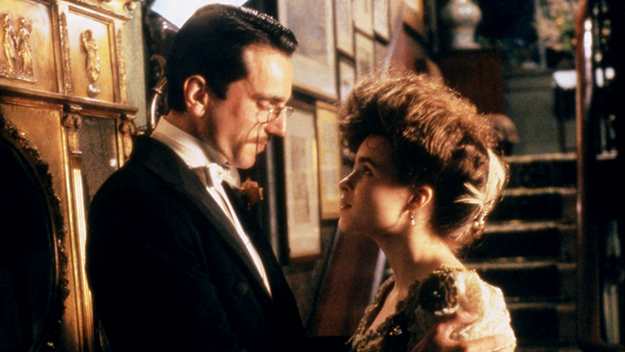
Ruth Prawer Jhabvala’s Oscar-winning screenplay uses dialogue that, in many instances, is lifted from Forster nearly word for word. In a particularly inspired choice, Forster’s chapter headings become intertitles that eliminate any need for a narrator: “The Reverend Arthur Beebe, the Reverend Cuthbert Eager, Mr. Emerson, Mr. George Emerson, Miss Eleanor Lavish, Miss Charlotte Bartlett, and Miss Lucy Honeychurch Drive Out in Carriages to See a View; Italians Drive Them.” Forster is so tangible in this movie—his wit, his sympathy for people, and his dislike of the things that keep them apart—that he almost seems to be hovering in a corner of the frame. But Jhabvala altered the 1908 novel in more ways than it seems, by pruning scenes and slimming down the long conversations between garrulous Edwardians. The illusion of absolute fidelity is the triumph of this adaptation.
Out of a 44-year partnership with Ivory, which began in the mid-’60s with movies such as the lovely Shakespeare Wallah, continued through the 1990s triumph of Howards End and The Remains of the Day, and ended with The White Countess, this film was said to be the personal favorite of Ismail Merchant. The producer, who died in 2005, was known for carefully chosen locations (you can, if you have the lolly, still stay in the Florentine hotel used in the film) and for lavish-looking production values achieved with slender means.
Another knack of Merchant’s: casting. Helena Bonham Carter was 19 and had made just one previous film, but she fit Forster’s description of Lucy as “a young lady with a quantity of dark hair and a very pretty, pale, undeveloped face” to the life. Voluble when she’s lying, big-eyed and tongue-tied when confronted with truth, Carter gives the performance that is the film’s essence. As Lucy careens through Beethoven both early and late in the film (a skill that Bonham Carter spent months learning to fake convincingly) the notes seem to float far beyond the well-dressed rooms, in search of more poppies and wheat fields.
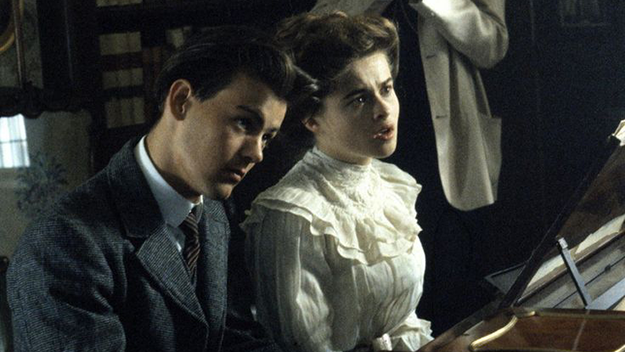
One of A Room With a View’s greatest pleasures is its troupe of veteran British character actors, who rip into every role with gusto. Pride of place must go to Smith as Charlotte. At the fateful picnic outside Florence, she tells Lucy not to worry about seating: “The ground will do for me. Really, I have not had rheumatism for years, and if I do feel it coming on, I shall stand up.” Smith’s deadpan courtesy in those lines belongs in a museum of passive-aggression. But Charlotte’s spinsterish manner conceals the desire for wider experience. At that moment, she wants Lucy to go away so she can confide in Miss Eleanor Lavish (Judi Dench), a writer of romances and collector of other people’s stories. Miss Lavish marches Charlotte around Florence, wielding a folded umbrella like a drum major’s baton, and in Charlotte’s timid fascination with this female adventurer are the seeds of her later decision to take a stand for young love.
James Ivory was by most accounts a more reserved presence than his partner. Simon Callow gave this illustration of Ivory’s on-set manner: “‘That was all right,’ he said once, after a particularly difficult scene in A Room with a View. ‘All right?’ I snapped. ‘By which, I mean, of course, sublime,’ he replied.” Something of Ivory’s calm, unhurried personality seems to drive the movie’s pace, which is deliberate but never dull.
With the screenplay as backbone, and Tony Pierce-Roberts as cinematographer, Ivory builds a highly effective vocabulary. All the wildest bursts of physical action occur outdoors, although these moments are almost always prematurely cut off. There are Lucy’s kisses with George, both the first in that field and a second, even more passionate one in her own garden, after she and George have spent an afternoon listening to Cecil read out loud. (As it happens, the reading material is the latest novel of Miss Lavish, describing—aha!—a kiss in a field. Despite his manner and telltale surname, it’s hard to truly dislike Cecil when his every move backfires in such spectacular fashion.)
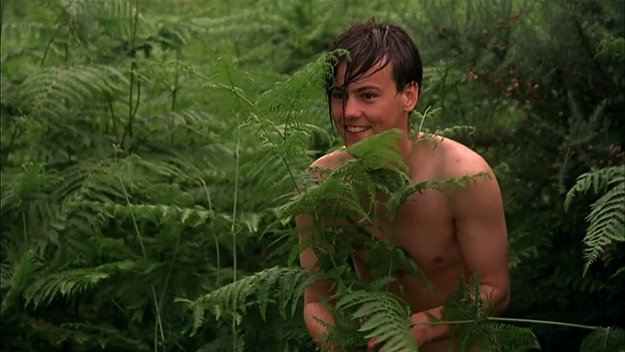
The most celebrated scene is the swimming party, where George and Rev. Beebe join Lucy’s brother Freddy (Rupert Graves) for a bout of joyous skinny-dipping: “Come and have a bathe,” says Freddy, minutes after meeting George. “Oh, all right,” is the response. First Freddy, then George, and finally the Reverend shed all those layers of clothes, and after some small mishaps (“Ugh, I’ve swallowed a frog” moans Freddy) they are cavorting like toddlers. It’s at the moment the men jump out of the pond for a spontaneous game of stark-naked tag that they are interrupted by Lucy, her mother (Rosemary Leach), and Charlotte, who are out for a walk with (of course) Cecil. “Why not have a comfortable bath at home?” Mrs. Honeychurch asks her son, after he’s managed to conceal the key parts of his anatomy behind a bush.
The film’s indoor settings, on the other hand, usually mean that something—a kiss, a laugh, an argument, a flirtatious look—is being stifled before it can even start. Charlotte spends much of her time pulling Lucy out of rooms to avoid George. Upper-crust stiffness is often played for laughs, such as Lucy’s attempt to kiss Cecil, while he purses his lips and finds his pince-nez being knocked off his nose. Other times, Ivory shifts the mood with enormous delicacy. After Lucy has abruptly broken off her engagement (“Because I wouldn’t play tennis with Freddie?” Cecil asks, thunderstruck), Day-Lewis gets his finest moment. Alone in the hallway, he slowly puts on his shoes, real heartbreak in every line of his body.
Julian Sands, in contrast with the chatterbox Cecil, plays George’s wooing of Lucy with many looks and few words. That is, until the moment when, via Forster, George declares: “He doesn’t want you to be real, and to think and to live. He doesn’t love you. But I love you…” Ivory allows Sands to say every word without a cut or a camera movement, so it contrasts all the more with the fretting and lies that have been leading up to this moment. In the rapturous final scene, George and Lucy are at the window overlooking the Duomo, physical love at last bursting the confines of tidy Edwardian rooms.
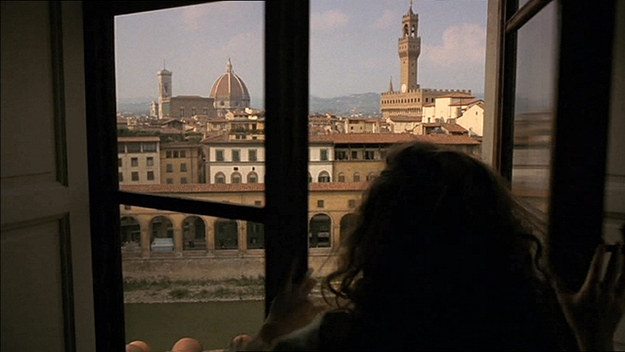
Orson Welles once said that a happy ending depended on where you broke off the story. Indeed Forster, perhaps in a fit of gloom brought on by approaching his 80th birthday, wrote an appendix to his novel in 1958. It outlined a future for Lucy and George that was wisely ignored for the movie. Instead, A Room with a View insists that falling in love with one person, and having that person fall in love with you at the same time, is one of the few true miracles that life can offer us all.
Farran Smith Nehme writes about classic film on her blog, Self-Styled Siren, and recently published her first novel, Missing Reels. She is a member of the New York Film Critics Circle.



